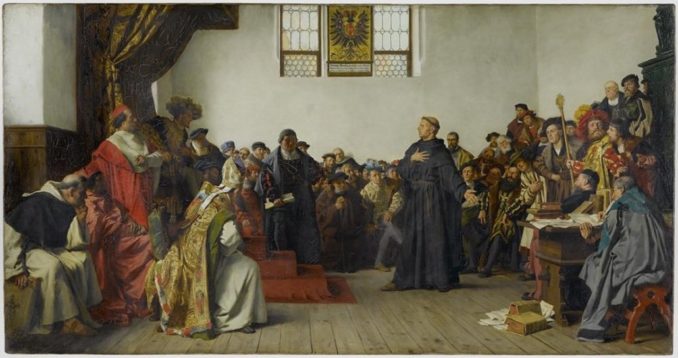
Anton von Werner [Public domain]
It led to the development of huge and monstrously complex full spectrum investment banks dabbling in just about every form of securities trading and advising clients how to lose their money. It was driven by the application of new computer-based trading systems and created organisations beyond the risk management competence of their senior leadership which ended up with most going bankrupt, often spectacularly (e.g. Barings, Bear Stearns, Lehman Brothers) or selling up.
Disintermediation was the one buzz word they used that impressed me. It told me that technology was fundamentally rewiring established patterns of trade and market organisation, and that it is a truly revolutionary phenomenon in the modern world, effecting almost every type of organisation, especially commercial ones. To this day I don’t believe many of those who used it then really understood its profundity and significance, which is why so many large organisations are going the way of the dinosaurs at ever faster speeds.
But it’s nothing new and not solely the preserve of our modern technology driven civilisation, although it has massively speeded up organisational life cycles to a dizzying extent and I suspect will continue to do so.
The First Disintermediation Revolution
The first revolution was prompted by the invention of the printing press and its spread in western Europe in the 15th century, which triggered the Reformation by making the readership of the Bible by ordinary people possible. The corrupt Medieval Roman Catholic church had hitherto been able to restrict the circulation of the Bible to Latin, a language largely the purview of the clergy which enabled it to introduce a whole stack of profitable ‘teachings’ that were contrary to the teachings of the New Testament. But once affordable samizdat vernacular editions of the Bible started circulating among the secular population the game was up, despite vicious repression by the clergy and their secular elite allies, hence the Reformation.
Luther and the other reformers had the success they did because of the ease with which their translations of the Bible and their writings about it could be published in huge numbers. A century earlier the English Reformer John Wycliff had made the same criticisms of the church, had laboriously translated the Bible and copied it by hand, but simply couldn’t produce the numbers of books cheaply enough to challenge the order of the day effectively. The difference was the invention of the printing press, the first great disintermediator because it allowed the average person to read the truth of the Bible rather than be told what was in it by a self-serving member of the clergy.
Furthermore, the translation and printing of the Bible sparked an explosion of literacy among normal people, taking learning out of the hands of the elite with incalculable consequences.
Christianity was disintermediated, one might even call Protestantism ‘Disintermediated Christianity’ emphasising the individual’s personal relationship with Christ, one not mediated through a sanctified clergy. This led eventually to the modern world we see today.
Today – the Second Great Disintermediation Revolution
Technology has advanced immensely since the early 16th century AD, the telephone, the railway and air transport, the car, but none in themselves have fundamentally rewired their societies and cultures in the way that the printing press did despite their respective dramatic impacts on society. One might argue that the development of radio and television did, and their effects on society have been profound, but in reality they are mass communication media controlled by the elite in which a few are able to promote their world views to the many because they are costly to run and/or highly regulated. They have not threatened or broken the power of the elite in the way the printing press did in its day, if anything they have strengthened it, shutting out discordant voices and opinions. But the elite’s grip is now being broken, albeit it is not a forgone conclusion and many bitter struggles will ensue just as the Roman church and its secular elite allies launched the brutal Counter-Reformation.
The driver of this new great disintermediation is an aggregation of cheap IT systems, the internet and smartphones, such that an opinion expressed in one corner of the world, or a video film shot on a personal smartphone, can go viral in a few hours around the whole planet through hundreds of thousands, millions, of file shares and social media interactions. Think the output of underground printing presses on speed. Who needs an expensive TV station, a broadcast licence, to present news and views to millions of people instantaneously anymore? Jo Shmo can for a few hundred £ Sterling.
The threat to established elites is obvious – potential YouTube Revolutions everywhere as the lies, omissions and half-truths elites use to buttress their privileges and corruptions are exposed to their social inferiors. Their response is equally obvious – control or ally with the emerging dominant technology platforms and companies, absorb them into the elite for after all their algorithms are as impenetrable to the modern common man as Latin was to a Medieval peasant, the equivalent of the Roman Catholic church suborning the likes of Luther, buying them off, offering a Cardinal’s hat. Are these new paladins of Google, Facebook etc men and women of the moral integrity of Tyndale, Luther, Zwingli etc? The signs are not encouraging.
But again technology may be coming to the rescue. Open source code, new digital platforms developed by bee-in-their-bonnet coders and entrepreneurs emerge to bypass the new but corrupting systems & social media establishment which is allying itself with the old elites. In some ways these new anti-establishment systems developers remind me of the second and third waves of Protestant reformers who fought off the Counter-Reformation, harder and more radical than the first generation of Luther etc, the English Puritans for instance, the Pilgrim Fathers…
Commercial and Organisational Effects
If the political and cultural effects of this second great wave of disintermediation are profound and potentially revolutionary, the commercial and organisational consequences are equally momentous and make the disintermediation of the ‘Big Bang’ look like molehill in comparison (it effected after all only a few tens of thousands of professionals directly, albeit it killed off most of the established companies within a decade or two).
Here I will speak from personal experience. That online shopping is disintermediating physical retail to death is well understood. A manufacturing company of which I am a director has for generations largely sold its consumer products through high street retail, predominantly department stores, its largest customer being John Lewis for many decades. Last year, after just a few years of trading sales through Amazon overtook those through John Lewis, while every other department store customer has stopped trading with us because they have closed down or are in trouble.
Now, one might argue that Amazon is simply replacing the department store as the intermediary in the retail sector, that retail is just moving off the high street and online, and there would be some truth in this, but I wonder if this is but an transitional phase. Increasingly customers can buy direct from the manufacturer – in this business sales via our own web channels will overtake JLR within a few years and all the margin remains with the manufacturer, enabling it to invest more in marketing, reduce end consumer prices, and to place its whole product range in front of the consumer other than just the small selection the retail chain buyer will choose to stock. For a branded manufacturer the advantages are obvious, as they are for the end consumer, but for those making a margin in between… oh dear…
Clearly, customer recruitment becomes the challenge for the manufacturer but it always was – you just have to go about it in the right way and disintermediation and clever algorithms, and brand merchandisers attending the right consumer events, can begin to fill the void created by the collapse of high street retailing. For manufacturers, used to selling through wholesalers and retailers, it’s happening so quickly that it’s disorientating and many won’t adjust in time. Those that do however may in decades to come be raising a very nice glass to the Second Great Disintermediated Revolution.
In Conclusion
The First Great Disintermediated Revolution took about two centuries to work through, upended nations and supranational institutions in the process and fundamentally changed the world view and mental horizons of the West. It led to appalling conflict, but such profound change generally does. Much was lost in the process, but more was gained. Today, a similar but different process is underway, and its more profound consequences lie in the future and only a fool would forecast them, but some early stage effects are already visible. The elites will try to seize control of it, to suborn its drivers to their own ends. If they succeed, we will get only its negative consequences and their defeat is by no means assured. If they do fail, utopia will not arrive (it never does), but the cause of freedom will be spared to fight another day. For the individual trying to scratch a living, avoid being an intermediary.
And so back to culture and the organisation of society and the political process. The dominance of representative politics and democracy is surely ebbing away. The EU Referendum put the People in direct conflict with Representative politics and fortunately the People won. I suspect the inhabitants of the Representative Politics bubble are somewhat chastened but have not fully grasped that this is the shape of things to come and that the pressure for all major issues to be settled by Referendum will grow ever larger. After all, if the People could decide on the fundamental issue of the UK’s sovereignty and independence, why not about crime & punishment, abortion rights, immigration, let alone local issues such as development planning? One can feel liberal elite hackles rising at the very idea, but why not? It would require voter registration and ID to be cleaned up, online voting to be made secure but these things in themselves are far from insuperable.
Just as disintermediation will kill the BBC et al, one can see the professional representative political class being placed in mortal peril, going the same way as high street department stores. They won’t all disappear because the daily issues of government cannot be decided by referendum, but major pieces of legislation certainly could and should be. Don’t trust the People to do this? Who are you? Tony Blair?
© 1642again 2020
The Goodnight Vienna Audio file


